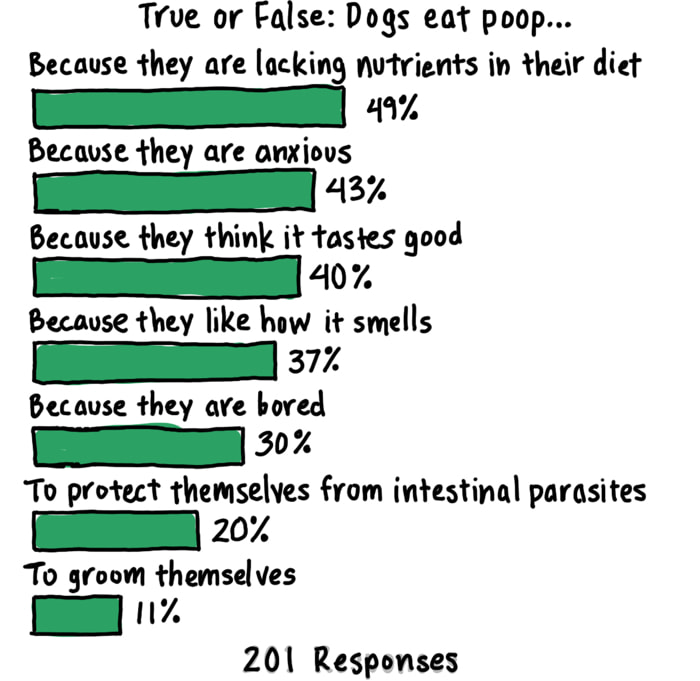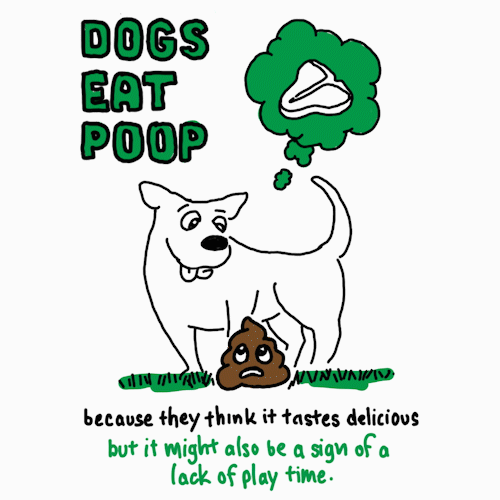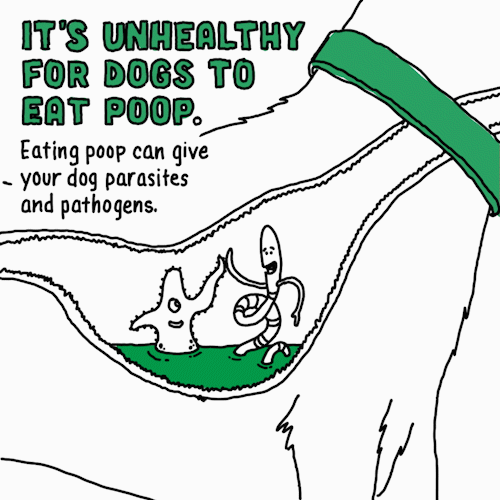

Like any companion or roommate, dogs — for all their love and cuteness—have habits we just don’t understand. One question dog owners often ask their pets: “Why? Why would you eat poop?”

When we polled* dog owners recently, most thought it was because a dog is lacking nutrients (49%), they’re anxious (43%) or they just think it tastes good (40%).
Dogs are significantly more likely to eat the droppings of another species (e.g., horses, rabbits) than their own.
We held our noses and got to the bottom of the issue with the help of some experts.
While those in our poll thought this was the number-one reason for the behavior, it has actually never been proven. “It’s a myth dogs eat poop because they’re seeking nutrients they aren’t getting. There’s no evidence to back this,” says
Opens a new windowDr. Jo Gale, BVetMed CertLAS MRCVS, Senior Manager, Global Science Advocacy at Waltham Petcare Science Institute.

According to Opens a new windowDr. Tammie King, Applied Behavior Technical Leader at Waltham Petcare Science Institute, “It can occur where there is lack of environmental enrichment. You see this often in dogs who are kenneled and have a lack of opportunity to exhibit normal canine behavior.” So if you need another excuse to get out and play with your pooch, this is a good one.
Believe it or not, this is the main reason dogs eat poop. Dr. Jo Gale explains: “Dogs are scavengers by nature and use any opportunity to eat what they can, when they can. They consider it a ‘tasty snack.’” Dr. Tammie King adds that “[Dogs eating poop] is a learned behavior. They’ve done it, enjoyed it, and that behavior is repeated.”
We love our dogs so much that we’re willing to trust our best friends on this. Maybe we should come out with a line of doggie breath mints though. Hmm.

“Ingesting feces from any animal increases potential for ingesting parasites and pathogens,” cautions Opens a new windowDr. James Serpell BSc, Phd Professor of Humane Ethics & Animal Welfare at University of Pennsylvania School of Veterinary Medicine. He went on to say, “[It’s] not something humans should ignore, but it's not worth getting too excited about it.”
All the experts we consulted said that if your dog occasionally eats poop, it’s nothing to be overly alarmed by. Just keep an eye on the frequency and their overall health. And as always, make sure they’re getting a nutritious diet and plenty of exercise and attention. If you have any concerns contact your vet.
Despite dogs liking the taste of poop, we’re going to stick with the healthy range of more traditional flavors offered in all IAMS dog foods.
*Surveyed U.S. dog owners, age 18+
Sample Size: n=201
Fielded May 8 to May 10, 2020


At the heart of your dog's vitality lies vitamin K. From ensuring proper blood clotting to promoting robust bone health, the importance of vitamin K for dogs’ well-being cannot be overstated. In this blog, we will uncover the benefits surrounding this essential nutrient, exploring its sources, functions, and why it is imperative for fostering a healthy and happy life for your furry friend.
Vitamin K, a crucial fat-soluble nutrient for dogs, holds paramount importance in their overall health. Best known for its role in blood clotting, vitamin K ensures your canine companion's body can effectively respond to injuries by forming clots, preventing excessive bleeding. Beyond its hemostatic function, vitamin K plays a key role in bone health, regulating calcium and supporting protein synthesis crucial for maintaining bone density.
Two main forms, K1 (found in green leafy vegetables) and K2 (sourced from animal products and fermented foods), highlight the importance of a diverse diet. Understanding these sources and functions is pivotal, ensuring your dog receives a balanced nutritional intake.
Yes, dogs can and should have vitamin K as part of their diet. While dogs can synthesise some vitamin K on their own, it is often not sufficient for their overall health. However, it's important to note that dog diets should be carefully curated, as excessive vitamin K supplementation can lead to adverse effects. Always consult with your veterinarian to determine the appropriate amount of vitamin K for your dog's specific needs. By incorporating the right sources of vitamin K into your dog's diet, you contribute to their blood clotting, bone health, and overall well-being.
Yes, Vitamin K is beneficial for dogs and plays a crucial role in maintaining their overall health. As mentioned previously, vitamin K is essential for blood clotting, which is vital in preventing excessive bleeding in case of injuries or wounds. It also contributes to bone health and supports the proper functioning of the cardiovascular system. Including sufficient vitamin K in a dog's diet is particularly important to ensure their blood coagulation mechanisms are functioning optimally.
While vitamin K is generally safe for dogs, it is essential to provide it in appropriate amounts. Excessive intake of vitamin K for dogs may lead to adverse effects, so it is recommended to consult with a veterinarian to determine the right dosage for your dog's specific needs. Additionally, pet parents should be cautious about offering human supplements, as they may contain ingredients that are harmful to dogs.
Understanding the diverse benefits of vitamin K for dogs is crucial in crafting a well-rounded approach to their nutritional needs. From supporting blood clotting to contributing to bone health, vitamin K plays a multifaceted role in enhancing your canine companion's overall well-being.
Vitamin K is pivotal in the synthesis of clotting factors, enabling your dog's blood to coagulate effectively. This ensures a rapid response to injuries, preventing excessive bleeding from minor wounds and promoting a quicker recovery process.
Beyond its hemostatic function, vitamin K regulates calcium within bones and facilitates the synthesis of proteins vital for maintaining optimal bone density. This not only supports skeletal strength but also contributes to a reduced risk of bone-related issues in your dog.
Research suggests that vitamin K possesses anti-inflammatory properties, potentially aiding in managing conditions characterized by inflammation, and promoting a more comfortable and active life for your furry friend.
Serving as an antioxidant, vitamin K helps protect cells from damage, fortifying your dog's cellular health and bolstering their immune function against external stressors.
Emerging studies indicate a potential link between vitamin K for dogs and cardiovascular health, with the vitamin playing a role in preventing the calcification of arteries. This aspect highlights the broader impact of Vitamin K on your dog's systemic well-being.
Incorporating vitamin K-rich foods into your dog's diet can harness these benefits, but it's essential to consult with your veterinarian to tailor a nutrition plan that aligns with your dog's specific needs and ensures a vibrant and healthy life.
Navigating the nutritional landscape for your canine companion involves understanding diverse sources of Vitamin K1 and K2. Here is a breakdown of some safe vitamin K foods for dogs:
Vitamin K for dogs is essential for their overall well-being, playing a crucial role in blood clotting and bone health. The importance of a diverse diet, encompassing both K1 and K2 from sources like green leafy vegetables and animal products, cannot be overstated. However, the key lies in moderation, as excessive supplementation may have adverse effects. It is essential to consult with your veterinarian to ensure informed decision-making. By responsibly incorporating vitamin K-rich foods into your dog's meals, you contribute to their resilience to tackle everyday challenges. This nutritional journey fosters a healthy and joyous life for your cherished furry companion.


At the heart of your dog's vitality lies vitamin K. From ensuring proper blood clotting to promoting robust bone health, the importance of vitamin K for dogs’ well-being cannot be overstated. In this blog, we will uncover the benefits surrounding this essential nutrient, exploring its sources, functions, and why it is imperative for fostering a healthy and happy life for your furry friend.
Vitamin K, a crucial fat-soluble nutrient for dogs, holds paramount importance in their overall health. Best known for its role in blood clotting, vitamin K ensures your canine companion's body can effectively respond to injuries by forming clots, preventing excessive bleeding. Beyond its hemostatic function, vitamin K plays a key role in bone health, regulating calcium and supporting protein synthesis crucial for maintaining bone density.
Two main forms, K1 (found in green leafy vegetables) and K2 (sourced from animal products and fermented foods), highlight the importance of a diverse diet. Understanding these sources and functions is pivotal, ensuring your dog receives a balanced nutritional intake.
Yes, dogs can and should have vitamin K as part of their diet. While dogs can synthesise some vitamin K on their own, it is often not sufficient for their overall health. However, it's important to note that dog diets should be carefully curated, as excessive vitamin K supplementation can lead to adverse effects. Always consult with your veterinarian to determine the appropriate amount of vitamin K for your dog's specific needs. By incorporating the right sources of vitamin K into your dog's diet, you contribute to their blood clotting, bone health, and overall well-being.
Yes, Vitamin K is beneficial for dogs and plays a crucial role in maintaining their overall health. As mentioned previously, vitamin K is essential for blood clotting, which is vital in preventing excessive bleeding in case of injuries or wounds. It also contributes to bone health and supports the proper functioning of the cardiovascular system. Including sufficient vitamin K in a dog's diet is particularly important to ensure their blood coagulation mechanisms are functioning optimally.
While vitamin K is generally safe for dogs, it is essential to provide it in appropriate amounts. Excessive intake of vitamin K for dogs may lead to adverse effects, so it is recommended to consult with a veterinarian to determine the right dosage for your dog's specific needs. Additionally, pet parents should be cautious about offering human supplements, as they may contain ingredients that are harmful to dogs.
Understanding the diverse benefits of vitamin K for dogs is crucial in crafting a well-rounded approach to their nutritional needs. From supporting blood clotting to contributing to bone health, vitamin K plays a multifaceted role in enhancing your canine companion's overall well-being.
Vitamin K is pivotal in the synthesis of clotting factors, enabling your dog's blood to coagulate effectively. This ensures a rapid response to injuries, preventing excessive bleeding from minor wounds and promoting a quicker recovery process.
Beyond its hemostatic function, vitamin K regulates calcium within bones and facilitates the synthesis of proteins vital for maintaining optimal bone density. This not only supports skeletal strength but also contributes to a reduced risk of bone-related issues in your dog.
Research suggests that vitamin K possesses anti-inflammatory properties, potentially aiding in managing conditions characterized by inflammation, and promoting a more comfortable and active life for your furry friend.
Serving as an antioxidant, vitamin K helps protect cells from damage, fortifying your dog's cellular health and bolstering their immune function against external stressors.
Emerging studies indicate a potential link between vitamin K for dogs and cardiovascular health, with the vitamin playing a role in preventing the calcification of arteries. This aspect highlights the broader impact of Vitamin K on your dog's systemic well-being.
Incorporating vitamin K-rich foods into your dog's diet can harness these benefits, but it's essential to consult with your veterinarian to tailor a nutrition plan that aligns with your dog's specific needs and ensures a vibrant and healthy life.
Navigating the nutritional landscape for your canine companion involves understanding diverse sources of Vitamin K1 and K2. Here is a breakdown of some safe vitamin K foods for dogs:
Vitamin K for dogs is essential for their overall well-being, playing a crucial role in blood clotting and bone health. The importance of a diverse diet, encompassing both K1 and K2 from sources like green leafy vegetables and animal products, cannot be overstated. However, the key lies in moderation, as excessive supplementation may have adverse effects. It is essential to consult with your veterinarian to ensure informed decision-making. By responsibly incorporating vitamin K-rich foods into your dog's meals, you contribute to their resilience to tackle everyday challenges. This nutritional journey fosters a healthy and joyous life for your cherished furry companion.